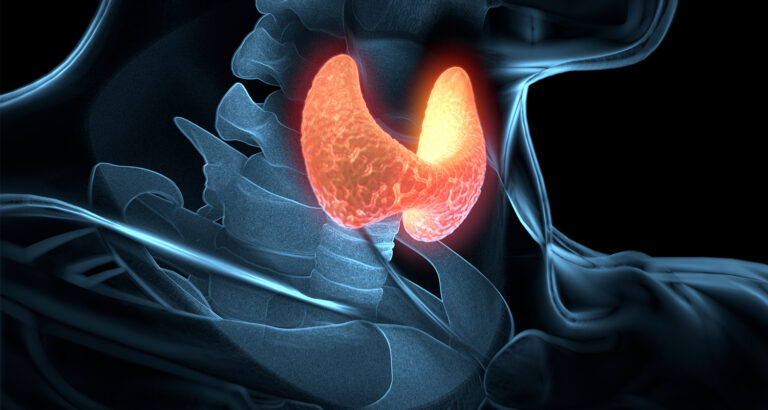
[tldr]
- About 12 percent of Americans have thyroid disease, and thyroid medication is the second most prescribed pharmaceutical in the United States. More and more people are suffering from thyroid issues, particularly hypothyroidism (and underactive thyroid).
- Diet and lifestyle play a big role in your thyroid function. Eating the wrong food can trigger autoimmune disease, as can chronic stress and poor sleep.
- Recent research also shows that fluoride interferes with your thyroid hormone production, even at the low levels found in drinking water.
- This article covers how you can use diet and lifestyle to support your thyroid.
[/tldr]
Hypothyroidism — when you have an underactive thyroid gland — is one of the most widespread conditions in the United States. About 12 percent of Americans have a thyroid disorder[ref url=”https://www.thyroid.org/media-main/press-room/”], and thyroid medication is the second most prescribed drug in the U.S[ref url=”https://www.ncbi.nlm.nih.gov/pmc/articles/PMC6025009/”].
Your thyroid gland controls your energy metabolism, which means you really want it to be working properly. But if you push yourself too hard — especially if you’re chronically stressed and aren’t eating well — your thyroid hormone production can start to decline.
This article will cover four major causes of hypothyroidism, and what you can do to support your thyroid and keep it running the way it should.
Download this Bulletproof 30-Day Upgrade to supercharge your body and brain
What causes hypothyroidism?
There are a few reasons your body might start shutting down your thyroid. In a recent Bulletproof Radio podcast episode, thyroid expert Izabella Wentz describes the root causes of hypothyroidism:
“The different things that could set off [hypothyroidism], in my experience, they’re going to be food sensitivities…they’re going to be nutrient deficiencies…there’s inflammation. There’s stress.”
Related: Signs Your Thyroid Is Out of Whack, and How to Heal It
Hypothyroidism symptoms
Hypothyroidism leads to a variety of symptoms, including:
- Weight gain
- Brain fog
- Fatigue
- Puffy skin, especially around your face
- Poor circulation
- Cold extremities
- Anxiety
- Muscle aches
- Depression
The good news is that you can support your thyroid (and address the root cause of hypothyroidism) with a few changes to your diet and lifestyle.
Hypothyroidism treatment
1. Avoid inflammatory foods
Your body down-regulates your thyroid when it thinks you’re going through lean or dangerous times and you need to conserve energy.
If you’re eating a poor diet — foods that cause inflammation, slow down mitochondrial function, and more — your body can take that as a signal that you’re in danger and downgrade your thyroid function so you don’t have to eat as much of the damaging food.
Inflammation and oxidative stress are two major drivers of hypothyroidism[ref url=”https://www.ncbi.nlm.nih.gov/pmc/articles/PMC4802023/”], and eating an inflammatory diet — one high in sugar and refined carbs, oxidized oils, lectins (for some people), and so on — can cause widespread inflammation and contribute to hypothyroidism.
Instead, eat an anti-inflammatory, nutrient-rich diet with plenty of quality fats to support your hormones. The Bulletproof Diet Roadmap is a great free guide to the best foods you can eat for high performance.
2. Manage chronic stress
Chronic stress also puts you at risk for hypothyroidism. Stress decreases your thyroid hormone production[ref url=”https://www.ncbi.nlm.nih.gov/books/NBK285560/”][ref url=”https://www.ncbi.nlm.nih.gov/pubmed/15650357″][ref url=”https://www.ncbi.nlm.nih.gov/pmc/articles/PMC3148770/”], possibly to help you conserve energy to get through hard times[ref url=”https://www.ncbi.nlm.nih.gov/pmc/articles/PMC2768616/”].
A brief dip in thyroid function is fine. But if stress is chronic and your body doesn’t get a break from it, your thyroid hormones can stay low for an extended amount of time, which can start to become a problem. Prolonged stress is also a risk factor for Hashimoto’s, a type of hypothyroidism where your body starts attacking your thyroid as if it were a foreign invader[ref url=”https://www.ncbi.nlm.nih.gov/pubmed/15650357″].
Managing stress is a skill you must learn if you want to be a high performer. It’s not optional; you have to recover hard if you’re going to work hard.
Related: How to Biohack Stress Like A Soldier
3. Upgrade your sleep
Low-quality sleep or lack of sleep can also trigger thyroid issues. Night workers have a 40 percent greater risk of hypothyroidism[ref url=”https://www.ncbi.nlm.nih.gov/pmc/articles/PMC5054581/”], and sleep-deprived people underproduce thyroid-stimulating hormone, which controls the amount of T3 and T4 thyroid hormones your body makes[ref url=”https://www.ncbi.nlm.nih.gov/pubmed/3782430/”].
To make things worse, hypothyroidism disrupts sleep further, which can start a cycle of sleep deprivation that’s hard to break[ref url=”https://www.ncbi.nlm.nih.gov/pubmed/2764018″].
Fortunately, there’s a lot you can do to improve your sleep. This guide to sleep hacking will help you get better sleep than you thought possible, which can help you balance your thyroid hormones (and a lot of other hormones) and encourage your body to repair itself.
Related: Bulletproof 30-Day Sleep Challenge
4. Avoid fluoride
You’ve probably heard about fluoride in tap water. Fluoride is supposed to protect people from cavities, although recent research shows that cavities have decreased equally in countries that don’t fluoridate their water[ref url=”https://www.hsph.harvard.edu/magazine/magazine_article/fluoridated-drinking-water/”].
A lot of people argue that fluoride shouldn’t be in water because it’s a neurotoxin. While it’s true that fluoride can cause brain damage, the devil is in the dose: you’d have to get far more fluoride than the amount in drinking water[ref url=”https://www.ncbi.nlm.nih.gov/pmc/articles/PMC4547570/”].
But the levels of fluoride in water can be a problem for your thyroid. Research in 2018 found that fluoride causes significant disruptions in thyroid function, even at half the maximum amount allowed in drinking water[ref url=”https://www.ncbi.nlm.nih.gov/pmc/articles/PMC5805681/”][ref url=”https://www.ncbi.nlm.nih.gov/pmc/articles/PMC3890436/”].
You’re best off avoiding fluoridated water. Get a high-quality water filter to keep your thyroid in good shape.
Hypothyroidism can be frustrating, especially when you have fatigue and brain fog and don’t feel like you have the energy to change anything. Stay hopeful; these simple tools can help you support your thyroid and get back to your strong, healthy self.
















